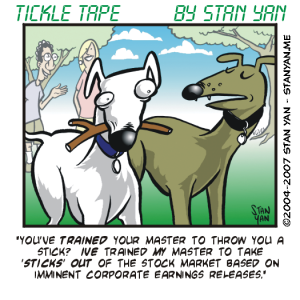In the trading profession, profits are hardly a sure thing. Even the most seasoned trader makes a big mistake occasionally and pays the price. Professional traders at large financial institutions, for example, can mount huge losses, as well as independent short-term traders. If you are experiencing a severe drawdown, don’t feel bad about it. You’re not the first person and you won’t be the last. Psychologically, however, it is difficult to avoid feeling uneasy. And depending on how severe it is, you may feel afraid, and ready to panic.
Facing losses is one of the most difficult issues to deal with emotionally. If you are an active professional trader, your identity and livelihood are on the line. If you are a part-time trader, it’s frustrating to feed your account from your day job and wonder if you’ll ever make back the money you’ve lost. Depending on your personality and experience with the market, you may have trouble handling feelings of loss, guilt, and fear. But unless you get your emotions under control, you’ll never be able to get back on track.
When some traders face a severe drawdown, they become especially guilty. We feel guilty when we break a personal moral rule. Losing money can make almost anyone feel guilty. We want to live by the rules our parents and teachers taught us, and many of them taught us to work hard and save our money. Short-term trading requires us to risk money, and to many, risking money seems to go against how we were brought up. For example, when many novice traders announce to their family and friends that they are going to become an active, short-term trader, the first reaction is “You’re going to lose your money.”
They say it as if novice traders are making a big mistake. Well, if you want to make huge profits in the end, you’re going to have to risk money, and in all likelihood, you’re going to lose a lot of it before you develop the skills you need to trade profitably across a variety of market conditions.
Are you going to lose money? Yes. Is it morally wrong? Not from the perspective of a trader. It’s vital that you identify the beliefs underlying your guilt and change them. The first question you must ask, though, is whether your guilt is warranted. Guilt can protect us. It isn’t a good idea to rack up so many losses that you can’t pay it back easily. If you trade money that you just can’t afford to lose or will have great difficulty paying back, you will naturally feel guilty. It is important to make sure that your losses are reasonable, and actually a temporary setback. Or, if the losses reflect a lack of skills, make sure that you can easily cover your losses from another source of income, such as a second job. It will be hard to control guilt if it really reflects losses that will permanently harm your financial security.
If you determine that you can actually afford trading losses, and still feel guilty, it is useful to look at possible assumptions that may underlie your guilt. One reason is that you may have been taught that money is sacred and that it is morally wrong to risk it and lose it for any reason. Many people hold this belief, but if you want to trade actively, you have to change the way you look at money. From the perspective of the serious trader, money is merely a vehicle to make more money. It is just part of the tools you need to trade successfully. Don’t think of it as “money” but as “points” you use to keep score of how well you are doing. A second assumption that underlies guilt is the need to be perfect. You may feel guilty because you believe that you must not make trading errors or rack up losses. You may believe that if you do, you are a “bad” person or inadequate. It is essential to avoid taking losses personally.
Losses are a natural part of trading. If you are a novice trader, you may mount losses, but it doesn’t mean that you are a “bad” person. If you have not yet developed requisite trading skills, you may be an unskilled trader, but you aren’t a bad person or inadequate. And if you are a skilled trader in a severe drawdown, you may feel guilty about something that isn’t your fault. It’s possible that you are merely experiencing a temporary change in market conditions. You may need to change your approach, but it doesn’t mean that you are inadequate. It just means that you need to explore more options. Guilt isn’t productive. When you feel guilty, then you ruminate about how bad things are. There’s no time to ruminate while actively trading, however. It gets you nowhere. If you want to stay ahead of the crowd, you must actively solve the problem. You must find new trading solutions, and guilt distracts you from freely searching for creative, fresh solutions.
Guilt can protect us at times, but while trading, we often feel guilty about losses that are just commonplace in the trading business. If you are experiencing unproductive guilt, it is essential that you learn to control it. The more you can trade calmly and freely, the more profits you’ll make.


